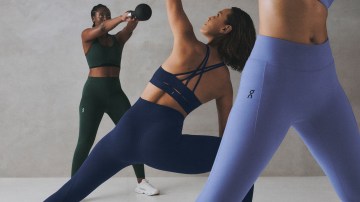This is an episode of the Glossy Fashion Podcast, which features candid conversations about how today’s trends are shaping the future of the fashion industry. More from the series →
Subscribe: Apple Podcasts • Spotify
This week on the Glossy Podcast, senior fashion reporter Danny Parisi and international reporter Zofia Zwieglinska break down the latest in luxury earnings, pricing shifts and political pushback. Later in the episode, Zwieglinska speaks with Vanessa Barboni Hallik, founder and CEO of sustainable luxury fashion brand Another Tomorrow, about the brand’s physical retail expansion and its approach to digital product passports. Barboni Hallik also discussed brand opportunities to scale circularity, during a conversation about Earth Week.
In this week’s news segment, Parisi and Zwieglinska discuss Kering’s first-quarter earnings, which painted a concerning picture, with overall revenue down 14% and Gucci plunging 25%. They talk about the vulnerability of conglomerates overly reliant on a single label and the way macroeconomic tension between the U.S. and China is complicating luxury’s recovery.
In other news, Louis Vuitton quietly raised its U.S. prices by nearly 5%, a move likely linked to tariffs and growing production costs. And, amid the U.S. administration’s ongoing efforts to dismantle DEI initiatives, major corporations and fashion brands are responding in different ways. While Target rolled back its diversity programs and saw 11 weeks of consecutive declines in foot traffic, companies like Levi’s and Costco have stood firm on their initiatives — and in some cases, benefited from doing so.
The power of digital product passports
Barboni Hallik: “One of the things we did from the very outset, which I’m a very strong advocate for, for all brands, is the digital ID component and the traceability and transparency that comes alongside that. Because I think customers are increasingly in a mode of ‘show me,’ and I think [having that] is really helpful. Every single item we’ve ever made has its own completely unique digital ID. That means that if there are two black blazers in an Italian size 38 that look identical, they actually have two completely different digital IDs, and that’s important, particularly for the resale component. You can scan the product, see the entirety of the supply chain, and leverage that for our authenticated resale and size exchange programs.”
Building a flagship store with sustainability at its core
Barboni Hallik: “How do we actually make sure that the space integrates not only our sourcing, but also our circular design philosophy? How do you effectively design for disassembly? We worked with this incredible architect, Anna Dyson, who is the founder of the Yale Center for Ecosystems in Architecture, and she came up with this incredible loom helix structure, inspired by a loom and built through mathematical modeling, that supports the clothing. The furniture is vintage. Some of the books are from my personal collection and [creative director] Liz [Giardina]’s. A lot of what you see in the space is deeply personal. It’s been a real homecoming and a way to visually communicate our values.”
Scaling impact without compromising values
Barboni Hallik: “We view scale as an opportunity for both enhanced impact and … proving that what we are doing is doable at scale. We’ve got a portfolio of about seven farms on the wool side that we produce with, and one of them actually sequesters carbon at the farm level. With this one in particular, we’re finding that we can actually scale even further with them, reduce our impact and deepen our relationships. We’ve brought on manufacturing partners that are carbon neutral, and we’re even looking at collaborative projects with other brands to support solar installation. There are all of these ways that you can scale with enhanced impact, as opposed to watering things down.”
Stories mentioned in this episode
Hermès price hike sets stage for American tourist boom in Europe
Earth Week
Activewear brands are scrambling to clean up in America’s age of health anxiety
Why brands like Blueland and Faherty are turning to sustainability activists for collaborations
Beauty & Wellness Briefing: The sustainability roadblocks impacting top brands today




